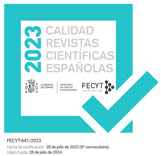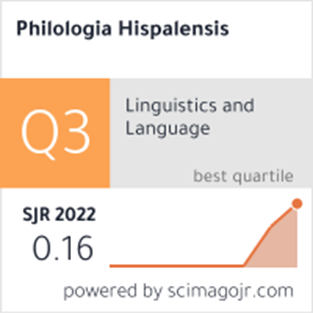Reseña de "Humour and Relevance" de Francisco Yus
DOI:
https://doi.org/10.12795/PH.2016.i30.15Palabras clave:
Humor, teoría de la relevanciaResumen
ReviewDescargas
Citas
Attardo, Salvatore (2002): “Semiotics and pragmatics of hour communication”, Babel A.F.I.A.L., Special Issue on Humor, 25-66.
Attardo, Salvatore/Hempelman, Christian F./Di Maio, Sara (2002): “Script oppositions and logical mechanisms: Modeling incongruities and their resolutions”, Humor 15, 1-44.
Attardo, Salvatore/Raskin, Victor (1991): “Script theory revis(it)ed: Joke similarity and joke representation model”, Humor 4, 293-348.
Curcó, Carmen (1995): “Some observations on the pragmatics of humorous interpretations. A relevance-theoretic approach”, UCL Working Papers in Linguistics 7, 27-47.
Curcó, Carmen (1996): “The implicit expression of attitudes, mutual manifestness and verbal humour”, UCL Working Papers in Linguistics 8, 89-99.
Curcó, Carmen (1997): The Pragmatics of Humorous Interpretations: A Relevance-theoretic Account. PhD Dissertation. London: University College London.
Dynel, Marta (2007): “Joking aside: Sociopragmatic functions of conversational humour in interpersonal communication”, in Cap, Piotr/Nijakowska, Joanna (eds.): Current Trends in Pragmatics. Newcastle: Cambridge Scholars Publishing, 246-268.
Dynel, Marta (2009): “Beyond a joke: Types of conversational humour”, Language and Linguistics Compass 3, 1284-1299.
Dynel, Marta (2010): “How do puns bear relevance?”, in Kisielewska-Kysiuk, Marta/Piskorska, Agieszka/Wałaszewska, Ewa (eds.): Relevance Studies in Poland. Exploring Translation and Communication Problems. Warsaw: Warsaw University Press, 105-124.
Dynel, Marta (2012a): “What RT cannot do, IR can: On the incremental interpretation of jokes in (non)relevance-theoretic terms”, in Wałaszewska, Ewa/Piskorska, Agnieszka (eds.): Relevance Theory: More than Understanding. Newcastle: Cambridge Scholars Publishing, 147-166.
Dynel, Marta (2012b): “Garden paths, red lights and crossroads: On finding our way to understanding the cognitive mechanisms underlying jokes”, Israeli Journal of Humor Research 1, 6-28.
Flamson, Thomas/Barret, H. Clark (2008): “The encryption theory of humor: A knowledge-based mechanism of honest signaling”, Journal of Evolutionary Psychology 6, 261-281.
Flamson, Thomas/Bryant, Gregory (2013): “Signals of humor. Encryption and laughter in social interaction”, in Dynel, Marta (ed.): Developments in Linguistic Humor Theory. Amsterdam: John Benjamins, 49-73.
Forabosco, Giovannantonio (2008): “Is the concept of incongruity still a useful construct for the advancement of humor research?”, Łodz Papers in Pragmatics 4, 45-62.
Grice, Herbert P. (1975): “Logic and conversation”, in Cole, Peter/Morgan, Jerry L. (eds.): Speech Acts. Syntax and Semantics. Vol. 3. New York: Academic Press, 41-58.
Hay, Jennifer (2000): “Functions of humor in the conversations of mean and women”, Journal of Pragmatics 32, 709-742.
Jodłowiec, Maria (1991a): The Role of Relevance in the Interpretation of Verbal Jokes: A Pragmatic Analysis. PhD Dissertation. Cracow: Jagiellonian University.
Jodłowiec, Maria (1991b): “What makes jokes tick”, UCL Working Papers in Linguistics 3, 241-253.
Koestler, Arthur (1964): The Act of Creation. London: Hutchinson.
Mascaro, Olivier/Sperber, Dan (2009): “The moral, epistemic, and mindreading components of children’s vigilance towards deception”, Cognition 112, 367-380.
McGhee, Paul E. (ed.) (1979): Humor: Its Origin and Development. San Francisco: Freeman.
Norrick, Neal (1993): Conversational Joking. Bloomington: Indiana University Press.
Norrick, Neal/Chiaro, Delia (2009): Humor in Interaction. Amsterdam: John Benjamins.
Padilla Cruz, Manuel (2012): “Epistemic vigilance, cautious optimism and sophisticated understanding”, Research in Language 10, 365-386.
Padilla Cruz, Manuel (ed.) (2016): Relevance Theory. Recent Developments, Current Challenges and Future Directions. Amsterdam: John Benjamins.
Raskin, Victor (1985): Semantic Mechanisms of Humor. Dordrecht: Reider.
Ritchie, L. David (2005): “Frame-shifting in humor and irony”, Metaphor and Symbol 20, 275-294.
Seewoester, Sarah (2011):“The role of syllables and morphemes as mechanisms in humorous pun formation”, in Dynel, Marta (ed.): The Pragmatics of Humour across Discourse Domains. Amsterdam: John Benjamins, 71-104.
Solska, Agnieszka (2012a): “Relevance-theoretic comprehension procedure and processing multiple meanings in paradigmatic puns”, in Wałaszewska, Ewa/Piskorska, Agnieszka (eds.): Relevance Theory: More than Understanding. Newcastle: Cambridge Scholars Publishing, 167-182.
Solska, Agnieszka (2012b): “The relevance-based model of context in processing puns”, Research in Language 10, 387-404.
Sperber, Dan (1996): Explaining Culture. A Naturalistic Approach. Oxford: Blackwell.
Sperber, Dan/Wilson, Deirdre (1986): Relevance. Communication and Cognition. Oxford: Blackwell.
Sperber, Dan/Wilson, Deirdre (1995): Relevance. Communication and Cognition. 2nd edition. Oxford: Blackwell.
Sperber, Dan/Clément, Fabrice/Heinz, Christophe/Mascaro, Olivier/Mercier, Hugo/Origgi, Gloria/Wilson, Deirdre (2010): “Epistemic vigilance”, Mind & Language 25, 359-393.
Suls, Jerry M. (1972): “A two-stage model for the appreciation of jokes and cartoons: An information-processing analysis”, in Goldstein, Jeffrey H./McGhee, Paul E. (eds.): The Psychology of Humor: Theoretical Perspectives and Empirical Issues. New York: Academic Press, 81-100.
Yus Ramos, Francisco (2003): “Humor and the search for relevance”, Journal of Pragmatics 35, 1295-1331.
Yus Ramos, Francisco (2008): “A relevance-theoretic classification of jokes”, Łodz Papers in Pragmatics 4, 131-157.
Yus Ramos, Francisco (2013): “An inference-centered analysis of jokes: The Intersecting Circles Model of humorous communication”, in Ruiz Gurillo, Leonor/Alvarado, Beatriz (eds.): Irony and Humor: From Pragmatics to Discourse. Amsterdam: John Benjamins, 59-82.
Descargas
Publicado
Cómo citar
Número
Sección
Licencia
Las ediciones impresa y electrónica de esta Revista son editadas por la Editorial Universidad de Sevilla, siendo necesario citar la procedencia en cualquier reproducción parcial o total.
Salvo indicación contraria, todos los contenidos de la edición electrónica se distribuyen bajo una licencia de uso y distribución “Creative Commons Atribución-NoComercial-SinDerivar 4.0 Internacional” ![]() . Puede consultar desde aquí la versión informativa y el texto legal de la licencia. Esta circunstancia ha de hacerse constar expresamente de esta forma cuando sea necesario.
. Puede consultar desde aquí la versión informativa y el texto legal de la licencia. Esta circunstancia ha de hacerse constar expresamente de esta forma cuando sea necesario.
Los autores/as que publiquen en esta revista aceptan las siguientes condiciones:
- Los autores/as conservan los derechos de autor y ceden a la revista el derecho de la primera publicación, y consienten en que se distribuya con una licencia Creative Commons By NC ND 4.0, que permite a terceros utilizar lo publicado siempre que mencionen la autoría del trabajo y a la primera publicación en esta revista, no se haga uso comercial y se reutilice de igual forma."
- Los autores/as pueden realizar otros acuerdos contractuales independientes y adicionales para la distribución no exclusiva de la versión del artículo publicado en esta revista (p. ej., incluirlo en un repositorio institucional o publicarlo en un libro) siempre que indiquen claramente que el trabajo se publicó por primera vez en esta revista.
- Se permite y recomienda a los autores/as que una vez publicado el artículo en la revista Philologia Hispalensis (versión online) se descarguen el PDF correspondiente y lo difundan por internet (ResearchGate, Academia.edu, etc.) ya que puede conducir a intercambios científicos productivos y a una mayor y más rápida difusión del trabajo publicado (vea The Effect of Open Access).
Aceptado 2017-02-24
Publicado 2016-07-17










